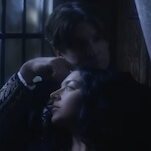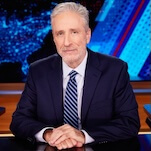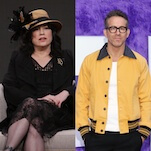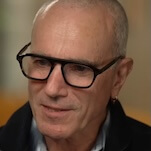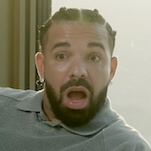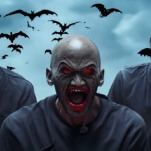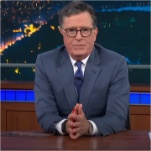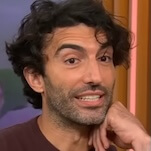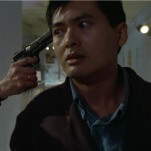O: Did you encounter a lot of sexism early in your career?
QL: No, not really. Maybe at the business end, because at that time there was still a stigma that female rappers couldn't sell records. But nobody was really putting money behind them to see if they could do it, or taking the time to make sure that their projects were tight. Salt 'N' Pepa were the only group to go platinum, but they went platinum off a pop record like "Push It." Me and MC Lyte had a lot of street buzz, but there hadn't been a gold record from us yet, so we had to fight with that for a while. But as far as the way I came out and the way I carried myself and the strength that I projected and the respect that I demanded, people pretty much gave me that from the beginning. They showed me that kind of love.
O: So there weren't any attempts to package you in a certain way?
QL: No, I designed my whole image. That was all me. They just gave me some money, my little budget to take promotional pictures. I had this store make me these outfits, these African outfits. And I just bought some regular clothes, threw a medallion around my neck, and that was it. The next thing I know, that's the look.
O: The video for "Ladies First" was overtly political. It's hard to imagine that video getting played on MTV today.
QL: Oh, yeah, we're a long way away from that. Plus, it was a whole different climate. You've got to understand, when I came out, the whole apartheid thing was really big. Coca-Cola had plants over there. There were all these companies in South Africa while they were still basically slave traders. Socially, hip-hop used to be a lot more outspoken than it is now. If anything, it's like we gave up our voice for tits and ass, for pop records and street shit. There's more to talk about than that.
O: Is that something you're nostalgic for?
QL: I'm definitely nostalgic about that. I miss Public Enemy. I miss Boogie Down Productions and Eric B & Rakim. There's so many other groups that made the balance of hip-hop really interesting. You had your hardcore groups, of course, but you had more of a choice, whereas a lot of groups go in the same direction now. They're talking about the same things, so it gets a little monotonous. And every once in a while, you get a little spark in there, with people who do it in a different way. You get an OutKast, a Nappy Roots, Slum Village, Jurassic 5. They're people who make you feel good about the music again.
O: OutKast is one of the groups signed to Flavor Unit management. How did that come about?
QL: It wasn't really too much about where they were from, so much as their music and their style. I like 'em. My partner Shakim and I saw them perform at the Summer Jam here in Los Angeles, and after the show, we just kind of talked to them and explained to them what we do and what kind of company we are, and why we were interested in managing them. We liked their style and their music, and we wanted to help them build their career, which is pretty much what we did.
O: How did you start managing acts?
QL: I never wanted to give up my power. I wanted to be able to make my own decisions, so that's why I became involved in management, bottom line. I interviewed a couple of potential managers who were popular at the time: Rush management, Uptown management, MC Lyte's manager. Being on the road for a year with no manager, with just my road manager Shakim and my mother and me, we started thinking that we could just do it ourselves. Sometimes when I would sit in front of these people, they just looked like snakes to me. I was really gun-shy about signing anything, let alone signing a contract with a management company. Some of them would go, "If you want to know about us, ask so and so," and then I would, and they'd say, "They're shitty. They're crooked." You should be careful who you try to get recommendations from. But I'm glad we did it our way, because it's pretty much been everything I wished it could be. I've never had to worry about somebody lying to me or hiding things from me or stealing things from me, or making decisions for me that will ultimately affect me in a harmful way.
O: Do you feel like the music industry doesn't have the artist's best interests in mind?
QL: Well, it's never really been about the artist's best interests. It's a business. That's where it all gets twisted up. That's why artists need to have somebody looking out for their best interests. Even within that, though, sometimes people are still just out for their own best interests. They con their groups or their artists into thinking that they're going to fight for them, but I've seen a million managers do deals that only benefit themselves. They need some money, so they do a shitty deal that isn't longevity-building because they need the commission immediately. You see some good ones and you see some bad ones.
O: Could you talk a little bit about the Flavor Unit label?
QL: The label was just an idea that Shakim and I had a couple of years ago. Really, the whole concept of what we wanted to do was to create a whole brand-management sort of company. We feel like artists are brands, not just artists. Queen Latifah is a Pepsi. Naughty By Nature is a Pepsi. You need to start treating these acts like brands instead of just throwing them away. We saw so many record companies that signed too many artists with big deals, and basically blew too much money and had to drop all these artists that had been platinum and gold artists in the past. To me, it seemed like that was a waste of a brand, because when you have something that's still viable and throw it away, it just makes no sense. We thought we could scoop them up and give them another shot through an independent-label situation. Once we understood the math of how the record industry really worked, it got to a point where we were like, "This just doesn't make sense for us anymore. We need to own these masters." That's the kind of stuff that you can retire on or pass on to your kids. That's where we were with it.
O: What prompted your transition into acting?
QL: That was just something that was fun to me in school. I used to do school plays. I never really took any acting classes. I'm just a natural ham, I guess. I kind of lucked out in that I got a chance to do a film that Spike Lee was doing, Jungle Fever; he wanted to put a rapper in this particular role of a waitress. He auditioned everybody that was hot at the time, and Monie Love actually got the role, but she was pregnant and couldn't do it. I was the one waiting in the wings. I went in and did it, and that was the beginning.
O: Was it intimidating working with Spike Lee on your first film?
QL: Oh, yeah. I was kind of petrified, not of Spike Lee, but because I didn't really know what I was doing. I just went over my pages and tried to wing it, to take his direction and apply it within five seconds, hitting marks and hair and makeup and the whole nine. It was an overwhelming experience, and it was only one day's work, but it was cool to me. Then I did Juice and that was fun, then Who's The Man, and then I started using the William Morris Agency, as opposed to just using the music division. I started needling those guys to get me more work, to turn over more stones. Finally, I got the right team, and things have gone very well.
O: Do you think the skills involved in rapping and acting are similar?
QL: Sort of, because when you're rapping, you do have to perform to a certain degree, but not every rapper is necessarily a gifted actor. But we perform through our videos, you know, where you see people who can be charismatic or emotional. How you work the mouthpiece and deliver those lines can be applied to acting.
O: How did the talk show come about?
QL: The talk show was an idea of Shakim's from a while ago. When Oprah mentioned that she might be retiring, Shakim said, "Wouldn't it be kind of dope if she could bring you under her wing the same way Johnny Carson did with Jay Leno, and kind of pass you the torch?" And I'm like, "Yeah, true, but I don't know if I want to be a talk-show host." When we get together, we kind of brainstorm and look at things and go, "You know what? We can do that." Sometimes it's just the challenge of seeing if we can do things. Rosie O' Donnell came on my show, Living Single, so she was there for a week, and shortly after that, she got her talk show. I guess when her company asked her who else she thought would be interesting as a talk-show host, she mentioned me. She felt like I was intelligent and charismatic and real enough to pull it off and bring something different. So they approached us, and we shopped it around to a few other companies, and they came with the best deal, so we went with them.
O: Was the talk show a good experience overall?
QL: It was a great experience for me. It was a great experience to be able to help people, which I was adamant about. I didn't want to just exploit people: They've got it hard enough, and we're making money from them talking about it, so we didn't want to exploit them in a negative way. We had a really good follow-up system with a psychiatrist and different programs, whether it was for overweight teens… We set up camps for them to go to in the summer to get a boost in their self-esteem, and so many came back feeling good. Whether it was drug programs, or just providing Christmas dinner for a family of 10 who couldn't afford it, or… There was a family that had quintuplets, and we gave them a van. To be able to do stuff like that was cool.
O: Looking back over your career, are you happy with the progress that female rappers have made?
QL: Definitely. At least the stigma is gone. We know that females in hip-hop can sell records. I think technically, I had the first gold record for a solo female artist with Black Reign in 1994, but right after that, Brat came out and went platinum. Lil' Kim came out and went platinum, Foxy Brown came out and went platinum, and Lyte had, I think, a gold single with "Cold Rock A Party." Over those couple years, we made so much progress in the sales area.
O: Is rap as important to you now as it was at the beginning of your career?
QL: Absolutely. Even if it's not what takes up the most time now, it's still what absorbs my brain the most. It's what I love. I've got the equipment in the house, and even if I don't have a record out, I'm still in my house making music. It's what I do, it's what I love, and everything else that has come to me has come to me through the music. I owe a lot to music.
O: Is it difficult to prioritize when you have so many projects in the works?
QL: It's difficult for the whole team to prioritize, but we only do what we want to do. I try to only commit myself to things that I think I can accomplish and commit myself to 100 percent. I try not to bite off more than I can chew, and between my manager, my assistant, my TV agent, my film agent, my music agent, my endorsements agent, and my publicist, everybody pitches in to balance my schedule and get their time. Then, at the end of the day, I'm the one saying when I want to take a day off, and they know not to call me. Unless it's Shakim or an important phone call, I turn it down. You work hard, you play hard, and it's important to get a lot of rest.
O: Of all that you've done in your career, what are you proudest of?
QL: I'm probably proudest of being able to lift a lot of us out of the 'hood. That's the biggest thing, that I've been able to employ a lot of people and give them opportunities. It's really not about what I'm able to do or what God blessed me with. It's more about opening up our company so we can get our crew out of all the raggedy deals that they're in, getting them signed and giving them a new shot. It's great to be able to employ people who other people wouldn't consider viable employees, because we come from the 'hood and we know who we're dealing with. There are so many talented people in our neighborhood, in our inner cities, who deserve a shot. They're not trained, necessarily, but they've got many ideas, and they look at things in a way that corporate America can't even imagine. These are the people that create and drive business, as long as you can tap into it. So I'm happy about that. Even with the talk show, we gave a lot of people shots, and now they're producers on other shows. In two years, they really stepped up and earned it, and we're proud of them—proud that they took the opportunity and seized it. I'm proud of whatever I've been able to do with females in this game by taking the chances that I've taken. That's opened up doors and allowed them to do what they want to do. And that's cool.
